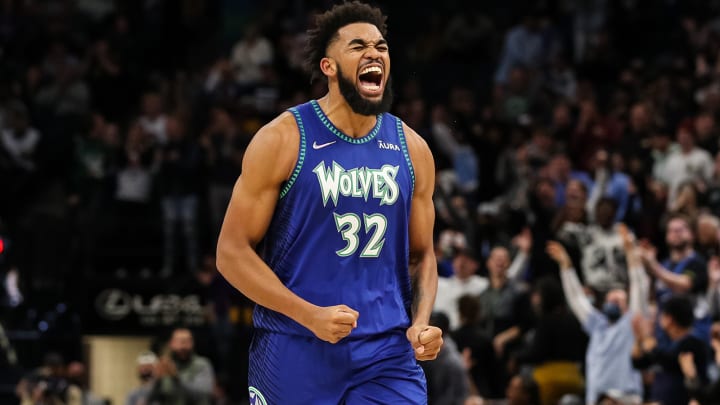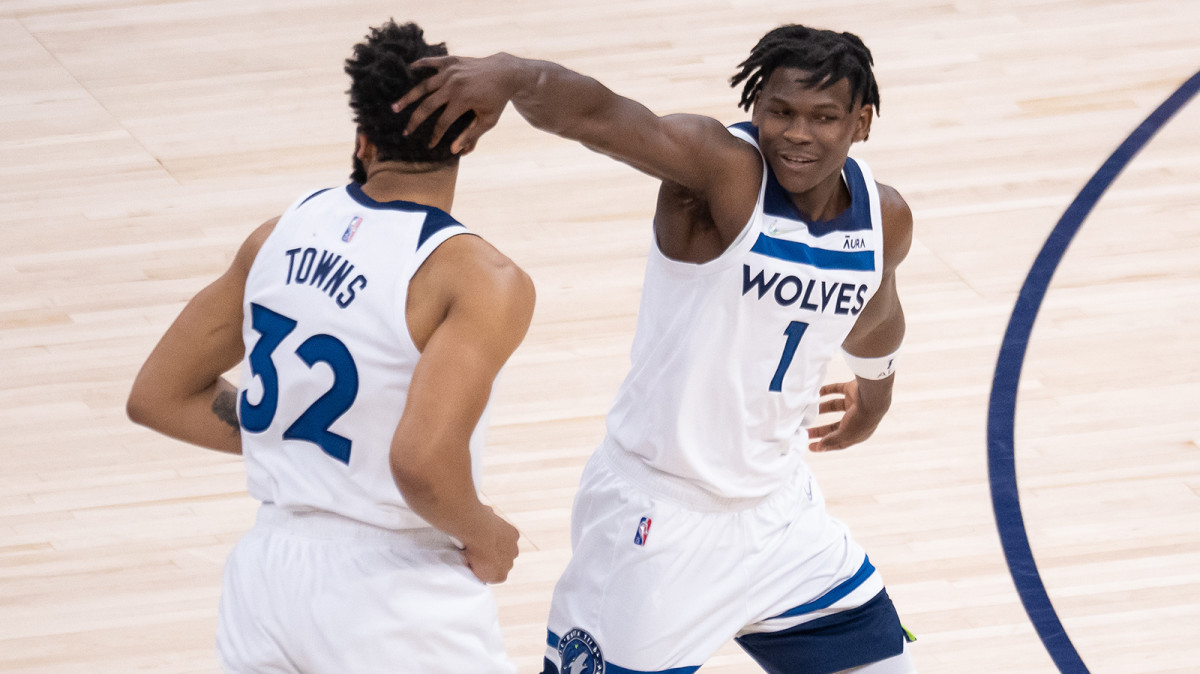‘This is the Beginning’: The Timberwolves are Building Something Special

MINNEAPOLIS—NBA rosters are ephemeral, constructed knowing change via improvement or implosion is perpetually around the corner. Few franchises understand this more than the Timberwolves. But despite getting eliminated from the postseason on Friday night by the Grizzlies, 114–106, after another fourth-quarter letdown in Game 6, Minnesota appears to be at the dawn of a new day.
Their first taste of playoff basketball since 2018 was an invaluable collective experience that should pay dividends down the line. Sustainability can (finally) follow. In defeat, this team has a better grasp of who they are and what they need to do to take another step forward, all knowing a solid—if not spectacular—foundation is already in place.
“Everybody gets exposed at the highest level for their weaknesses, their flaws, the things that they have to learn and grow,” Chris Finch said after Game 6. “Myself included.”
Karl-Anthony Towns is 26 years old and will qualify for a supermax contract extension if he makes an All-NBA team. Minnesota should offer it if they’re allowed to. Anthony Edwards is 20 (lol) with talent that foreshadows perennial All-Star recognition and MVP buzz. In his playoff debut, the 2020 No. 1 pick averaged 25.2 points on 45.5/40.4/82.4 splits. Earlier this season, Patrick Beverley compared him to Michael Jordan. Having those two complementary cornerstones means the hard part is taken care of. Towns, Edwards and 21-year-old Jaden McDaniels (who finished Game 6 with five threes, 24 points and a handful of game-changing blocks and dunks) can grow together.
In his first full season on the bench, Finch proved himself as a sage tactician on offense (the Wolves were the NBA’s most efficient team in 2022) who found ways to plug holes in a roster that had several, particularly on the defensive end. The talent was obvious. The wisdom was beneficial.

On top of it all, a decent bit of Minnesota’s success may come from the way it’s different from so many seasons before.
These Timberwolves had some of the best continuity in the entire league: From last season to this one, they rolled over 83% of their minutes, second only to the Hawks. “It's very beneficial,” Timberwolves forward Jarred Vanderbilt said. “It's rare that a team gets to stay together that long, or a long period.” It’s also atypical behavior from a team that finished 26th in net rating during the 2020-21 season. It also made everyone’s life a little easier.
“[Continuity] certainly helped us coming into the season, because we had a really good evaluation period last year to know what we had, know what we could do, know that our big three guys fit together as well as we thought they would,” Finch said. “And, you know, it just allows a team to keep growing up together. You can also evaluate what they can and can't accomplish or execute, particularly defensively. Like what schemes you could be better at, what schemes you probably need to stay away from. And then obviously, lineup combinations, like who plays best with whom, those types of things. It gives you a head start on that.”
Their offseason was quiet, highlighted by the acquisition of Beverley and Taurean Prince. They also waved goodbye to Jarrett Culver, a lottery pick who never panned out. Instead of participating in a blockbuster trade for someone like Ben Simmons or John Collins, they kept everything static. Zero transactions were made at February’s trade deadline, too, partly because they believed their negotiations were being made from a position of strength. They didn’t have to do anything. Talks were had, of course, and some were serious. But nothing was obvious, and as a team that was firmly in the seven seed throughout February, the bar was high to risk disrupting their locker room and on-court performance.
There are a hundred reasons why any front office decides to preserve its roster in-season or from one year to another. The Timberwolves are positioned to maintain what they’re building. And in an unquantifiable way, for the short-term, the players appreciate it.
“It's valuable, you know, it's valuable,” Towns said. “I'm used to having just a whole new group and you're trying to figure it out, and it's playoffs or bust, and no one has seen each other ever in their lives and haven't played with each other, now we're trying to figure it all out on the fly. So it's great to have some familiarity with each other, you know?”
The significance of roster continuity is unknown without context. It’s useless in some situations and critical in others. There’s a “which came first: the chicken or the egg” quagmire involved: Do teams stay together because they’re good, or are they good because they stay together?
As a young, ascending team coming off a gut check playoff appearance, the Timberwolves now have to deal with higher expectations. How they get better may not require any major transactions, though the team isn’t afraid to make them. They also know internal improvement from Edwards and McDaniels, in particular, allows them to cultivate the chemistry that’s been established over these past two seasons without too many additions and subtractions.
Their cap sheet also helps. Everyone in their playoff rotation is under contract next season except Prince. Short-term improvement can be marginal, utilizing four draft picks (including No. 19), their full mid-level and bi-annual exceptions. For a team that can use more size, someone like Isaiah Hartenstein or Chris Boucher could be a quality target. A seen-it-all, done-almost-everything veteran like Jeff Green may not be a bad idea at the right price. (Timberwolves backup center Naz Reid is restricted and it’ll be interesting to see how much they’re willing to invest in him.)
From there, continuity is wonderful, but the Timberwolves may have a pretty good opportunity to shed their skin the following summer, when D’Angelo Russell’s max contract comes off the books along with Beverley’s extension. (On Russell, who was benched during the fourth quarter in Game 6, Finch said: “D'Lo had a great season for us. And he had a hard time settling into this series.”) Malik Beasley also has a $16.5 million team option that Minnesota can turn down and create a window before Edwards’ inevitable max contract kicks in to go shopping in free agency with a max slot to fill. There’s pretty much no better place to be in a franchise life cycle: competitive, full of hope, on an incline.
A ton will happen before then, though. Trajectories aren’t promises. They’re projections. But keeping this core together and letting them grow for another year should be a given. How that would benefit everyone involved is hard to measure but easy to articulate.
“I think the league understands who we are. They know what we are, not that laughingstock team like everyone has tried to paint us and make us out for all these years,” Towns said after Game 6. “We came out, balled out, gave ourselves a chance. I think that this is the beginning of something special and it's also one of the first times in this franchise where a lot of pieces are falling into place. It doesn't feel so scrambled. It doesn't feel so random.”
More NBA Coverage:
